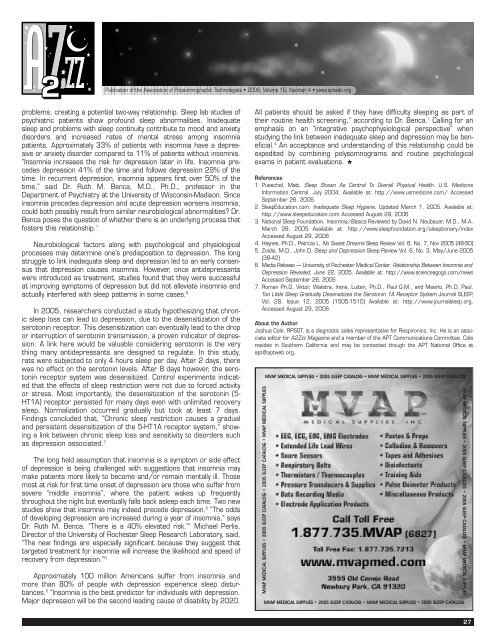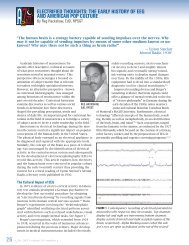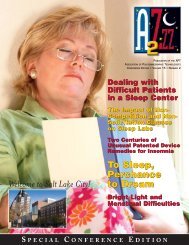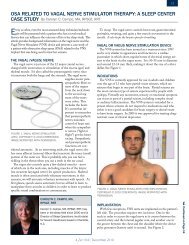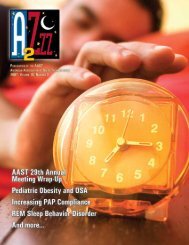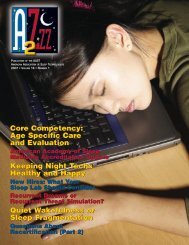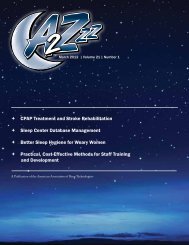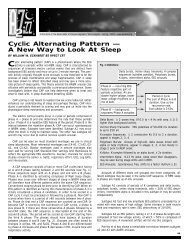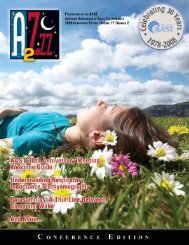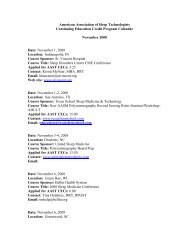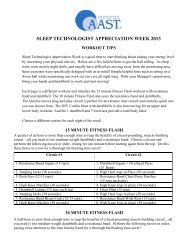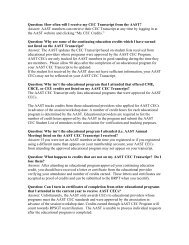APT Practice Parameter for Standard Polysomnography APT ...
APT Practice Parameter for Standard Polysomnography APT ...
APT Practice Parameter for Standard Polysomnography APT ...
- No tags were found...
Create successful ePaper yourself
Turn your PDF publications into a flip-book with our unique Google optimized e-Paper software.
Publication of the Association of Polysomnographic Technologists • 2006, Volume 15, Number 4 • www.aptweb.orgproblems, creating a potential two-way relationship. Sleep lab studies ofpsychiatric patients show profound sleep abnormalities. Inadequatesleep and problems with sleep continuity contribute to mood and anxietydisorders and increased rates of mental stress among insomniapatients. Approximately 33% of patients with insomnia have a depressiveor anxiety disorder compared to 11% of patients without insomnia.“Insomnia increases the risk <strong>for</strong> depression later in life. Insomnia precedesdepression 41% of the time and follows depression 29% of thetime. In recurrent depression, insomnia appears first over 50% of thetime,” said Dr. Ruth M. Benca, M.D., Ph.D., professor in theDepartment of Psychiatry at the University of Wisconsin-Madison. Sinceinsomnia precedes depression and acute depression worsens insomnia,could both possibly result from similar neurobiological abnormalities? Dr.Benca poses the question of whether there is an underlying process thatfosters this relationship. 1Neurobiological factors along with psychological and physiologicalprocesses may determine one’s predisposition to depression. The longstruggle to link inadequate sleep and depression led to an early consensusthat depression causes insomnia. However, once antidepressantswere introduced as treatment, studies found that they were successfulat improving symptoms of depression but did not alleviate insomnia andactually interfered with sleep patterns in some cases. 6In 2005, researchers conducted a study hypothesizing that chronicsleep loss can lead to depression, due to the desensitization of theserotonin receptor. This desensitization can eventually lead to the dropor interruption of serotonin transmission, a proven indicator of depression.A link here would be valuable considering serotonin is the verything many antidepressants are designed to regulate. In this study,rats were subjected to only 4 hours sleep per day. After 2 days, therewas no effect on the serotonin levels. After 8 days however, the serotoninreceptor system was desensitized. Control experiments indicatedthat the effects of sleep restriction were not due to <strong>for</strong>ced activityor stress. Most importantly, the desensitization of the serotonin (5-HT1A) receptor persisted <strong>for</strong> many days even with unlimited recoverysleep. Normalization occurred gradually but took at least 7 days.Findings concluded that, “Chronic sleep restriction causes a gradualand persistent desensitization of the 5-HT1A receptor system,” showinga link between chronic sleep loss and sensitivity to disorders suchas depression associated. 7The long held assumption that insomnia is a symptom or side effectof depression is being challenged with suggestions that insomnia maymake patients more likely to become and/or remain mentally ill. Thosemost at risk <strong>for</strong> first time onset of depression are those who suffer fromsevere “middle insomnia”, where the patient wakes up frequentlythroughout the night but eventually falls back asleep each time. Two newstudies show that insomnia may indeed precede depression. 6 “The oddsof developing depression are increased during a year of insomnia,” saysDr. Ruth M. Benca, “There is a 40% elevated risk.” 1 Michael Perlis,Director of the University of Rochester Sleep Research Laboratory, said,“The new findings are especially significant because they suggest thattargeted treatment <strong>for</strong> insomnia will increase the likelihood and speed ofrecovery from depression.” 6Approximately 100 million Americans suffer from insomnia andmore than 80% of people with depression experience sleep disturbances.5 “Insomnia is the best predictor <strong>for</strong> individuals with depression.Major depression will be the second leading cause of disability by 2020.All patients should be asked if they have difficulty sleeping as part oftheir routine health screening,” according to Dr. Benca. 1 Calling <strong>for</strong> anemphasis on an “integrative psychophysiological perspective” whenstudying the link between inadequate sleep and depression may be beneficial.4 An acceptance and understanding of this relationship could beexpedited by combining polysomnograms and routine psychologicalexams in patient evaluations. ★References1. Pueschel, Matt. Sleep Shown As Central To Overall Physical Health. U.S. MedicineIn<strong>for</strong>mation Central. July 2004; Available at: http://www.usmedicine.com/ AccessedSeptember 26, 2006.2. SleepEducation.com. Inadequate Sleep Hygiene, Updated March 1, 2005. Available at:http://www.sleepeducation.com Accessed August 29, 20063. National Sleep Foundation. Insomnia/Basics Reviewed by David N. Neubauer, M.D., M.A.March 28, 2005 Available at: http://www.sleepfoundation.org/sleeptionary/indexAccessed August 29, 20064. Haynes, Ph.D., Patricia L. No Sweet Dreams Sleep Review Vol. 6, No. 7, Nov 2005 (48-50)5. Zoidis, M.D., John D. Sleep and Depression Sleep Review Vol. 6, No. 3, May/June 2005(38-42)6. Media Release — University of Rochester Medical Center. Relationship Between Insomnia andDepression Revealed, June 22, 2005. Available at: http://www.scienceagogo.com/newsAccessed September 26, 20067. Roman Ph.D, Viktor, Walstra, Irene, Luiten, Ph.D., Paul G.M., and Meerlo, Ph.D, Paul.Too Little Sleep Gradually Desensitizes the Serotonin 1A Receptor System Journal SLEEP,Vol. 28, Issue 12, 2005 (1505-1510) Available at: http://www.journalsleep.org.Accessed August 29, 2006About the AuthorJoshua Cole, RPSGT, is a diagnostic sales representative <strong>for</strong> Respironics, Inc. He is an associateeditor <strong>for</strong> A2Zzz Magazine and a member of the <strong>APT</strong> Communications Committee. Coleresides in Southern Cali<strong>for</strong>nia and may be contacted though the <strong>APT</strong> National Office atapt@aptweb.org.MVAP MEDICAL SUPPLIES • 2005 SLEEP CATALOG • 2005 SLEEP CATALOG • MVAP MEDICAL SUPPLIESMVAP MEDICAL SUPPLIES • 2005 SLEEP CATALOG • MVAP MEDICAL SUPPLIES • 2005 SLEEP CATALOGMVAP MEDICAL SUPPLIES • 2005 SLEEP CATALOG • MVAP MEDICAL SUPPLIES • 2005 SLEEP CATALOGMVAP MEDICAL SUPPLIES • 2005 SLEEP CATALOG • 2005 SLEEP CATALOG • MVAP MEDICAL SUPPLIES27


